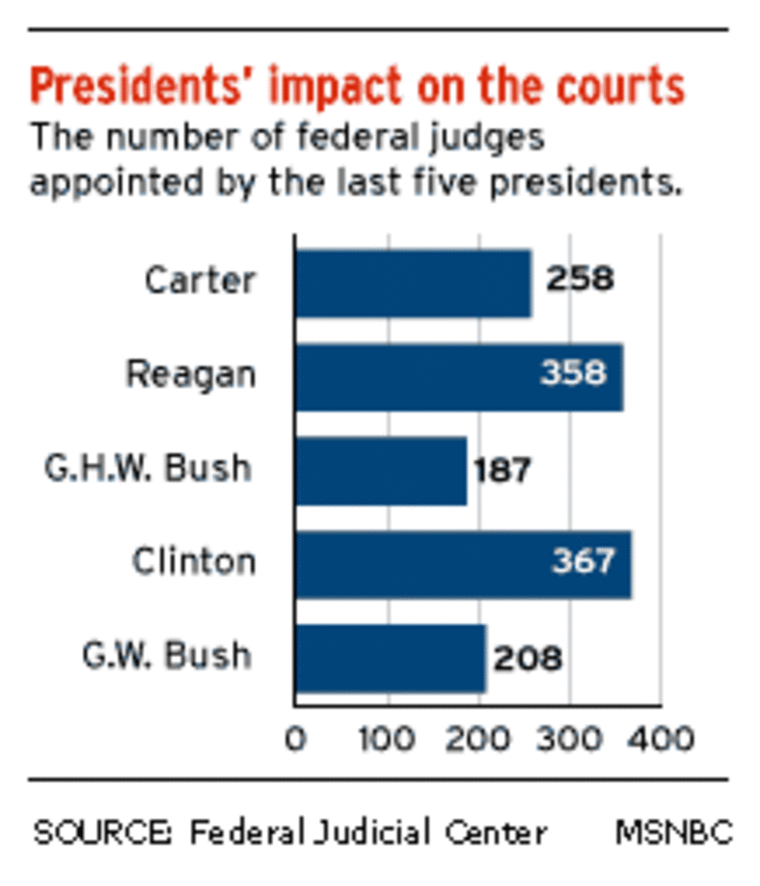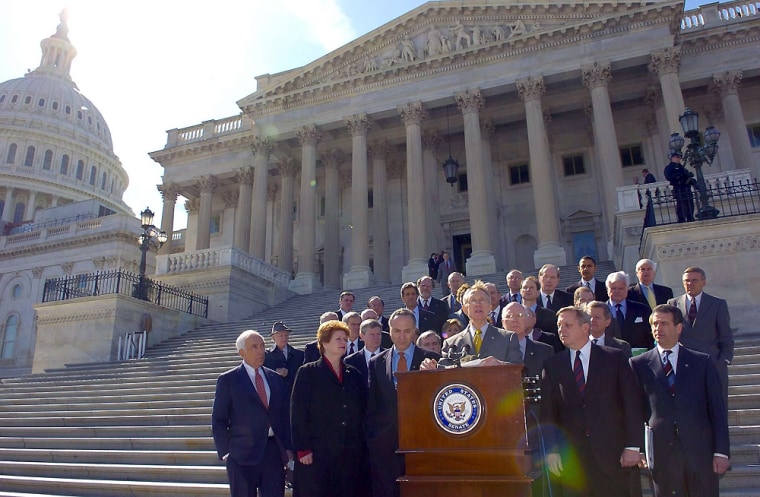Surrounded by 37 Democratic senators on the steps of the Capitol, Democratic Leader Sen. Harry Reid of Nevada threatened Tuesday to shut down the Senate over the issue of filibusters of President Bush’s judicial nominations. Reid would exempt from his shut-down only national defense matters and spending needed to ensure ongoing federal operations.
Right after the Senate returns from its two-week break, which begins Friday, Senate Majority Leader Bill Frist is likely to move to change a Senate rule that requires 60 votes to cut off debate on a nomination in order to bring it to final up-or-down vote.
Frist would lower the filibuster threshold for nominations to 51.
Reid called on Americans to “oppose this arrogant abuse of power” and accused Bush and his Republican allies in the Senate of trying to “break down the separation of powers and ram through their appointees to the judicial branch.”
He charged Bush and Frist with harboring a “desire for absolute power.”
'Cataclysmic event'
“If Republicans want to go down this road, they are going to be beginning a huge, partisan, cataclysmic event, the implications of which are so profound that none of us really know the answer to it,” said Sen. Max Baucus, D-Mont., one of the Democrats arrayed behind Reid on the Capitol steps. “It would mean the government could not function, which, more importantly, means we could not be doing the people’s work.”
Since beginning the filibuster strategy in March 2003, the Democratic minority in the Senate has killed 10 of Bush’s nominations to the federal appeals courts by threatening to keep talking on the floor until they were withdrawn.
Bush made a total of 51 appeals court nominations in his first term. Of those nominations, 35 were confirmed, 10 were killed by filibuster and six did not emerge from the Judiciary Committee.
Bush later used his recess appointment power to give two of the filibustered nominees, William Pryor and Charles Pickering, temporary spots on the federal appellate bench.

Reid made a point of noting in his statement Tuesday that “only 10 of 214 nominations have been turned down.”
Republicans counter that most of those approved were district court nominees.
District court judges conduct trials, but have little power to hand down rulings in cases with constitutional implications. The real power to affect constitutional law is on the appeals courts and the Supreme Court.
Key Democrats: Nelson, Lieberman
Conspicuous by their absence from Reid’s Capitol steps event were two Democrats: Sen. Ben Nelson of Nebraska, who has voted against all but one of the Democratic filibusters since 2003, and Sen. Joe Lieberman of Connecticut. Both men are up for re-election next year, and Nelson is running in a state Bush won with 66 percent of the vote.
David DiMartino, a spokesman for Nelson, said the senator has indicated that he will not vote for Frist’s proposed rule change. Instead, Nelson is working on a proposal for a permanent rules change that would allow the majority party to circumvent the filibuster. Nelson would require a specific time frame for the Senate to vote up or down on a nominee.
Under Senate rules, Nelson’s proposed change would require 67 votes in order to take effect, which makes it unlikely to pass in the current environment.
Reacting to Reid’s threat, Sen. John Cornyn, R-Texas said, “When the American people realize that they are threatening to shut down government because we want to restore majority rule in the United States Senate, I think it’s going to backfire on them terribly.”
Cornyn said the 2004 election results, which gave the GOP a net gain of four Senate seats, were driven largely by voter opposition to Democratic filibustering of Bush’s judicial nominees.
“If we don’t do this (lower the filibuster threshold), I think those people who gave us the large majority and re-elected the president are going to think that we have been ineffective, and you know what happens to people who voters think are ineffective: They get unelected,” he said.
Cornyn said he was confident there are enough Republican senators to get the 50 needed to approve the parliamentary move to lower the filibuster requirement.
Looking to Supreme Court vacancy
He said it was “absolutely” necessary to resolve the filibuster issue before a vacancy occurs on the Supreme Court. “Once we get a Supreme Court vacancy, I think that’ll overwhelm virtually every other issue.”
There are at least a few GOP senators who have said they would oppose the filibuster change that Frist will seek.
One of them, Sen. Lincoln Chafee of Rhode Island, said Tuesday, “The important thing is to try to avoid these confrontations so that a nominee could get bipartisan support. I like to give the executive full leeway to make these choices, whichever party it is. The main thing is to get nominees who are not going to be lightning rods and polarize. Then we’re not in that situation of threatened filibusters.”
Chafee is up for re-election next year in a state that John Kerry carried with 60 percent of the vote.
A Republican who will vote to lower the filibuster threshold for nominees, Sen. George Allen of Virginia, predicted that “the Democrats are going to have heck of a time pulling this off. There’ll be senators like Ben Nelson and Joe Lieberman who will say, ‘Wait a second, we tried this play for the last two years and Tom Daschle is our former leader.”
Daschle lost his Senate seat partly due to South Dakota voters’ disenchantment with his leadership of the Senate Democrats on the filibuster strategy.
“The reality is they’re not cooperating on much of anything anyway,” Allen said of the Democrats. “Ultimately, if they try to hold up the energy bill, hold up welfare reform, I really do think they’ll just be digging a deeper grave.”
“There’s a lot of bluffing going on here and I think we ought to call their bluff. We shouldn’t cower, we should not be timid,” he said.
Democrats often point to delays and obstruction of President Clinton’s judicial nominees by Republican senators, accusing the GOP of inconsistency in its current stance.
"All we have ever asked for (Clinton nominees) Marsha Berzon and Richard Paez is that both nominees get an up-or-down vote," Sen. Dianne Feinstein, D-Calif., said in 1999. "If a senator has a problem with particular nominees, he or she should vote against them. But a nominee should not be held up interminably by a handful of senators."
Ultimately in March of 2000, both Paez and Berzon were confirmed by the Senate and both now serve on the federal appeals court for the 9th Circuit.
